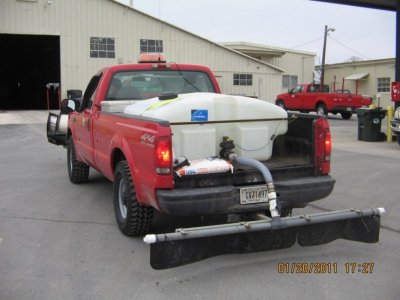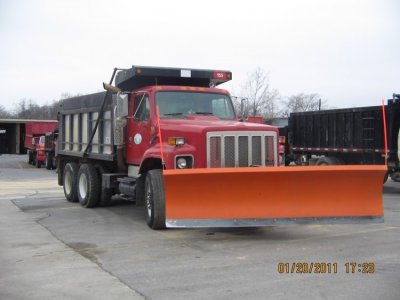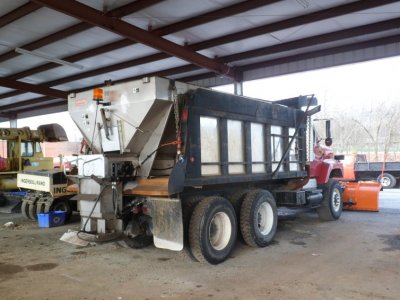Keeping Roads Clear - A Homemade Solution
 Friday, January 7th, 2022
Friday, January 7th, 2022
When the Dalton Public Works Department needed to change their game plan for keeping the city’s roads clear in winter weather events, they didn’t go out and buy an expensive new salt brine system.
They simply built their own.
“Ours is homemade, it’s a crude operation but it works.”
“I guarantee we’ve got less than five thousand dollars in this operation,” said operations manager Maurice “Reece” Carroll, one of the fathers of the city’s salt brine system.
For many years, Dalton Public Works responded to winter weather events by spreading rock salt mixed with pea-sized gravel on the city’s streets. That plan has a lot of problems, though, not the least of which was that rock salt needs moisture to be effective. Also, once the weather event is done, crews had to go back out with street sweepers to get the gravel back off of the road or risk damage to vehicles on the roads. But watching a news report gave Dalton’s managers a better idea.
“It was nine or ten years ago, Reece was watching the news and they were showing how Chattanooga was doing it,” said Benny Dunn, Dalton’s Public Works Director.
“Chattanooga’s been using salt brine for years,” Carroll said. “So we all went to Chattanooga and they let us come and look at their operation. Of course, it’s huge compared to ours but they’ve got a lot more ground to cover.”
“So we got to thinking, ‘heck, we can build something like that.’”
“Coming back from Chattanooga, I was driving and Reece and Doug [Blaylock, the city’s fleet manager] were sitting in the back brainstorming,” Dunn said.
What the pair came up with was a gravity-driven system with a pipe system that sprays water over bins filled with rock salt which then drains down into a tank where the solution can be tested to make sure the mixture has the right amount of salt. From there, it goes into a storage tank, ready to be poured into tanks on pickup truck beds where it’s sprayed on city roads.
“If you get the mixture where it’s just right, the salt brine is good down to minus 6 degrees,” Carroll said before adding, “and if it gets down that low we’ve got some calcium we can add to the mixture to heat it up even more. Ours is homemade, it's a crude operation but it works."
The salt brine can keep ice from forming on treated roadways. Once ice does form, or in snow events where snow or ice do accumulate on the road, the brine keeps it from bonding with the pavement and sticking.
“So when your plow trucks come, it just knocks the snow right off and the road is clear,” Carroll said. “And in ice events where you’ve got black ice everywhere it works great. You just run across it and the ice is gone.”
“We’re weather watchers around here.”
Benny Dunn and his crew stay glued to the weather forecast 365 days a year. The Dalton Public Works Director knows that the weather affects everything he and his team work on, whether it’s construction or paving or just recycling collection. And when the forecast calls for winter weather, Public Works crews shift gears toward getting ready to keep the roads cleared.
“When we get an emergency management meeting at the EOC (the 911 Emergency Operations Center) and we determine when the event is going to come in, within a day or the start of the event we’ll mobilize to go pre-treat the roads,” Dunn said.
“They say you can do it 48 hours before, but we try to start a little closer so it will be more fresh,” Carroll added.
There’s a priority system for what areas receive pre-treatment first. Top priority is the entrance ramps to the hospital’s emergency room. Next, the city’s bridges like the Waugh Street bridge and the Walnut Avenue bridge. Then steep grades like the section of Emery Street near the cemetery and the mountain roads such as Mt. Sinai and Dug Gap Battle Road. From there, attention shifts to main thoroughfares and then secondary roads and residential streets.
"Every working day we stay glued to the weather forecasts," Dunn said. "We're weather watchers around here."
Below: Some of the trucks used by the Public Works Department to spread the salt brine mixture onto road ways and also plow accumulated snow or ice.



“I went out there this morning and it was all clear.”
When winter weather warnings began to sound earlier this week for a possible snow/ice event on Thursday, January 6th, Public Works crews went into action. The event turned out to be heavy rain fall with the temperature above freezing followed by a temperature plunge after the rains cleared.
Rain can cause problems for the salt brine operation, but Public Works crews still went out to work on the roads in advance of the event.
“The only bad thing about salt brine is that if you know there’s a lot of rain ahead of the event, there’s no sense putting out a lot ahead of time because rain can dilute it and wash it off. It’ll stay better than you might think, but you’re still spinning your wheels,” Carroll said. “We still do the bridges and the mountains and the hospital, the 911 center even though it might rain.”
Crews mobilized around 4 AM on Thursday and got to work on the roads, coming back in around lunch time to go on standby and wait for the weather. Work resumed after the rain ended. Crews returned around 5 AM Friday to work on any problem areas.
"They had a big event [Friday] morning at the Convention Center so we wanted to make sure we hit the roadway and their parking lot," Dunn said. "I went out there this morning and it was all clear."
With more winter weather possible in the weeks ahead, Dalton’s Public Works Department will stay vigilant and stay ready to treat and clear the roads with their homemade solution.
“It’s just amazing how much more economical it is than what we were doing before,” Carroll said. “One ton of salt will pre-treat almost 40 lane miles. If you imagine what one ton of salt would do if you just sling it on the road, it might get you a few miles, but not very far.”
